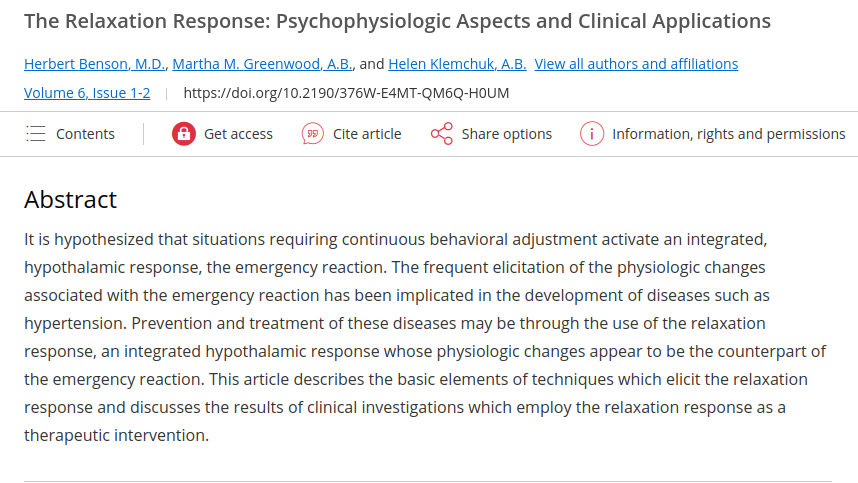Publication
The International Journal of Psychiatry in Medicine
6(1-2)
Abstract
It is hypothesized that situations requiring continuous behavioral adjustment activate an integrated, hypothalamic response, the emergency reaction. The frequent elicitation of the physiologic changes associated with the emergency reaction has been implicated in the development of diseases such as hypertension. Prevention and treatment of these diseases may be through the use of the relaxation response, an integrated hypothalamic response whose physiologic changes appear to be the counterpart of the emergency reaction. This article describes the basic elements of techniques which elicit the relaxation response and discusses the results of clinical investigations which employ the relaxation response as a therapeutic intervention.
Web and Email Links
Related Listings
Journal
Psychiatry
In the Western world today, there is a growing interest in nonpharmacological, self-induced, altered states of consciousness because of their alleged benefits of better mental and physical health and improved ability to deal with tension and stress. During the experience of one of these states, individuals claim to have feelings of increased creativity, of infinity, and of immortality; they have an evangelistic sense of mission, and report that mental physical suffering vanish (Dean). […]
Journal
Behavioral Medicine
The authors compared characteristics of 1,012 outpatients completing a 10-week behavioral medicine intervention with 300 outpatients who dropped out. They administered the Symptom Checklist-90 Revised (SCL-90R) before and after the program. Patients who completed the treatment, compared with dropouts, tended to be more highly educated, married, and gainfully employed. Their pretreatment scores on the SCL-90R were significantly lower than those of the dropouts on somatization, depressi […]
Journal
Science
Sympathetic nervous system activity was assessed in experimental and control subjects who were exposed to graded orthostatic and isometric stress during monthly hospital visits. After the first session, the experimental subjects practiced a technique that elicited the relaxation response. Their concentrations of plasma norepinephrine during subsequent graded stresses were significantly higher. No such changes were noted in the control group. These results were then replicated in the c […]

